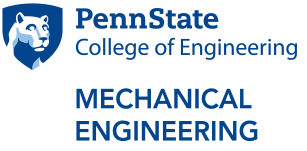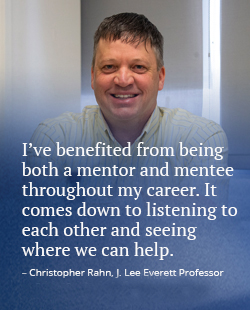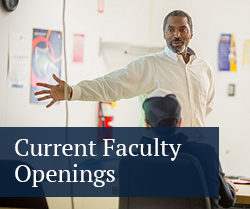
Mentoring of Assistant Professors
Mentoring is a valuable activity through which all faculty will benefit by having a productive colleague and successful Promotion and Tenure (P&T) case. The Department of Mechanical Engineering has a mentoring program with the main goal of assisting untenured faculty as they navigate the requirements of promotion and tenure. Participation is not mandatory. This short document identifies the responsibilities of a mentor, identifies the responsibilities of the department, and provides suggestions on effective mentoring.
Selection of Mentors/Mentees
- Each year (no later than June 30) the assistant professors who are interested in participating in the mentoring program in our department will provide the names of two potential mentors to the associate department head for administration.
- The associate department head will contact the potential mentors to assess their interest in serving the program.
- The final mentor selection will be determined by the associate department head for administration in consultation with the department head.
- The final mentor/mentee list will be completed and communicated to the faculty by August 1.
- Every attempt to assign the mentee’s first choice will be made.
Responsibilities of the Mentors
- The primary responsibility of the mentor is to provide critical advice to the mentee that will help her or him become a productive faculty member through efforts in research, teaching, and service.
- The mentor should review their mentee’s dossier prior to submission to the P&T Committee (for example, for the 2nd, 4th, and 6th year reviews). The mentor should provide a critical assessment of the mentee’s activities in terms of number and quality of proposal/paper submissions, teaching evaluations, and graduate student progress.
- Mentors, as well as other faculty and administrators, may be called upon to have lunch with all mentees to provide general advice on how to be a successful faculty member.
- Mentor should be in contact twice per semester (if possible) about the mentee's career and activities.
- Mentor should discuss annual performance reports and reviews with the mentee: how to prepare, what to expect, how to deal with different outcomes. Previewing the document before it is submitted to the department and providing guidance on finalizing it will be helpful to the mentee.
Responsibilities of the Mechanical Engineering Department
- Explain the department policies regarding the P&T process in their first month of appointment in Year 1, and in the spring each year thereafter.
- Make sure that the teaching and service loads for the mentees are not overburdening and are consistent with their other duties.
- In conjunction with the College of Engineering, conduct general workshops on teaching and research for the mentees.
- Consider inviting department speakers who will serve as outside evaluators (letter writers) and help mentees to target professional activities to increase their visibility in preparation for letters.
- Feature assistant professors at each Mechanical Engineering Industrial Advisory Board meeting to provide networking potential and feedback on their research/teaching directions.
Best Practices and Suggested Activities for Meeting the Needs of the Mentees
- Mentor/mentee pairs should meet in person at least once per semester. For example, they could grab lunch together at least once a semester where the mentor can inquire about their progress, and address any questions or concerns since the last meeting.
- Mentor may provide assistance to the mentee in proposal writing by offering to review proposals, serving as a sounding board for new ideas and writing joint proposals when possible.
- Mentor can make sure the community is aware of mentees’ work by introducing them to visitors or mentioning them in presentations at other institutions/funding agencies.
- Mentor could provide informal teaching advice by volunteering to attend one of their classes.
- Mentor should provide informal discussions on the progress of mentee and any problems that he or she may be facing. The mentor’s role is to be supportive in listening to their concerns.
- Exchange CVs with your mentee to stimulate discussion about career paths and possibilities.
- Mentor should ask about and encourage accomplishments, and provide constructive criticism and feedback.
- Mentor can aid the junior faculty in exploring the institutional, school, and departmental culture, i.e. what is valued? What is rewarded?
- Mentor should share knowledge of important university and professional events that should be attended by the junior faculty member.





